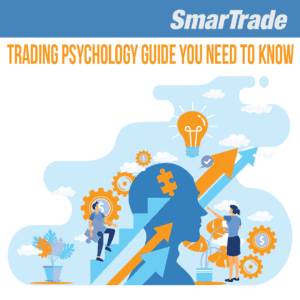Trading Psychology Guide

Trading Psychology Guide you need to know to have the proper mindset and tips to decision making to become a successful online trader. It Describes the mindset and feelings that affect a trader’s conduct and decision-making in the financial markets. It is essential to decide whether a trader is successful or unsuccessful.
These crucial elements of trading psychology
Emotions
Feelings like fear, greed, and overconfidence can significantly impact the trading decisions you make. While greed might result in taking unwarranted risks, fear can cause people to hesitate or avoid making potentially advantageous trades. Making reasonable decisions based on analysis rather than emotions is crucial, as is maintaining emotional restraint.
Patience and Discipline
Successful traders adopt a patient and disciplined strategy. They avoid acting impulsively by waiting for high-probability trade setups and sticking to their trading strategy. Besides, they accept losses as a necessary element of trading because they know that only some trades will be profitable.
Risk management
An essential element of trading psychology is risk management. To reduce potential losses, traders must ascertain their level of risk tolerance and select suitable stop-loss settings. Risk-reward ratios and position size approaches can support a disciplined risk management approach.
Confidence
A trader needs confidence in their skills. However, being overconfident can be harmful. It’s essential to create a balance between arrogance and modesty. Excessive risk-taking and a failure to recognize potential market dangers can result from overconfidence.
Adaptability
The capacity to adjust to shifting market conditions is essential. Traders should be willing to change their tactics and methods as needed. Also, it has to be rigidity and resistance to change can impede development and lead to lost opportunities.
Mental Resilience
The financial markets can be complex. Traders will experience times of losses and drawdowns. The capacity to recover from setbacks. It remain focused and have a positive outlook in trying circumstances. It’s known as mental resilience. It entails making amends for errors, moving on from setbacks, and retaining faith in one’s trade ability.
Stress Management
Trading may be stressful. Mainly, when there is a lot of market volatility when there are losses involved. To maintain mental and emotional health, traders must learn efficient stress management techniques. On top of that, the stress levels can be decreased through regular exercise. A mindfulness exercises helps including taking pauses from trading to reduce stress.
Self-Awareness
Knowing one’s talents, shortcomings, and prejudices is essential in trading. The psychological inclinations of traders, such as a penchant for impulsive trading. Being extremely risk-averse, should be recognized. Journaling and self-reflection can be used to identify and deal with these biases.
Confidence in Uncertainty
Trading participants must accept that financial markets are inherently unpredictable. The trading judgments can be improved. In addition, the irrational conduct caused by fear or panic can be avoided. All by having faith in one’s capacity to handle ambiguity while controlling risk.
A strong trading mindset requires time and expertise to develop. Along with honing their technical and fundamental trading abilities. Traders frequently focus on developing their attitude and emotional self-control. Moreover, being helped by mentors are involve in the trading networks. Engaging in self-reflection exercises can all help you build a strong trading psyche.
